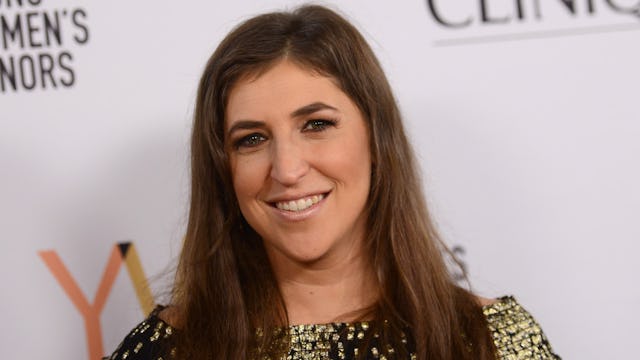Mayim Bialik Makes The Best Argument Against Spanking You’ve Ever Heard

Structure and consistent parenting wins over spanking, Bialik says
Actress and mom Mayim Bialik is not one to shy away from controversial topics, offering her opinion on everything from divorce, breastfeeding, and why we shouldn’t call women “girls” on her popular YouTube channel. A recent video of hers is really striking a chord with parents as Bialik tackles a much-debated topic that every parent seems to have a strong opinion either for or against – spanking.
In a clip titled “Hitting Kids,” Bialik strongly disagrees with the idea that kids who aren’t spanked or hit will turn out to be spoiled brats who misbehave. Instead, she believes parenting with consistency and compassion is the best way to raise well-behaved children and foster a healthy relationship with our kids.
Bialik begins the six-minute video by addressing the source of the most popular justification for corporal punishment — the Bible. Some quote the Bible as justification for spanking their kids, saying “Whoever spares the rod hates their children.” But then again, she points out, the Bible is also cool with throwing stones at a disobedient son. So, Bialik says, “Let’s not use the Bible as a parenting guide for the 21st Century.”
Instead, the mother of two says we should listen to research stating that hitting children is not the answer. The first longitudinal research study shows that hitting may negatively impact children developmentally, mentally, and physically. Statistically, Bialik says, the results are not favorable.
Also, as with most species, if humans experience pain from a source, they will seek to elude that source, or person, in the future. “Hitting teaches avoidance not obedience,” Bialik says. Of course, she says, hitting some kids won’t have a lasting impact, but for others, it does. And it can be traumatic for them their entire lives. Why risk this outcome if we as parents have no way of knowing how our child will respond down the line?
Children, Bialik explains, are wired to trust their caregivers. “Being hurt by someone who says they love you makes no more sense to a child than it does to an adult. You can’t hit your spouse, you can’t hit your student, you can’t hit a stranger, you can’t even hit your dog,” she says. So why are we able to hit our kids? Bialik believes in most cases, it’s because we as parents run out of patience, not because hitting is a better discipline method.
Another reason parents might hit their kids is to stop unwanted behavior. And Bialik admits it can be effective — in the short term. But at what cost? “I understand how tempting it is to look for quick solutions for behavior that you don’t want to see continue,” she says. And even though it’s the harder choice, she chooses to parent with compassion and respect. “I’m one of the stricter parents I know. It’s not my job to be my kid’s friend, I’m their mom.”
Bialik believes it’s important to set boundaries and offer structure, as well as remove children from situations where they’re being disruptive. She says her 3-year-old son started throwing wooden trains, which were “dangerously close to his baby brother’s head.” So, she took all of his trains and put them in a bin on top of the fridge. For three days he cried for his trains every time he saw the bin, but she didn’t give them back. Once she finally did, he never threw a train again.
Similarly, if a child whines a lot, “A week of consistently saying ‘the answer to that voice is no’ makes it go away.” If parents follow through and consistently do not reward bad behavior, eventually children will learn not to do it anymore. When her kids throw sand or misbehave at the park, she carries her crying kids out of the park, consistently, because “that’s what following through looks like sometimes.” Of course it would be easier to give her kid “a little smack” but that isn’t going to build a relationship of open communication with her children.
By finding other ways to discipline beyond spanking, Bialik says that she and her kids always have “emotional money in the bank.” When they have challenges, they can work from a “foundation that’s based on comfort, safety, and a mutual desire for growth.”
Consistently making the decision to be present and offer other forms of discipline is not easy, but choosing not to hit or spank our kids makes for a healthier relationship and sets a foundation built on trust and mutual respect.